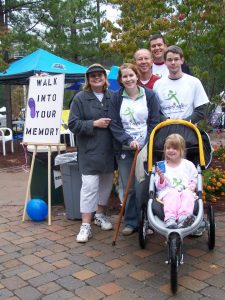From Hurting to Helping
When my dad was diagnosed with Lewy body dementia in 2001, I was a freshman in college. He was only 54, and the idea that anyone so young could have this foreign-sounding disease seemed unfathomable. It was isolating for our family, for my dad and for me.
 Over the course of almost ten years, we watched my dad become a different person. Yes, he lost his short-term memory, but he also experienced other symptoms of dementia: unsteady walk, repeating words and stories unless he couldn’t find the words, hallucinations or delusions, changes in thinking, aggression and more.
Over the course of almost ten years, we watched my dad become a different person. Yes, he lost his short-term memory, but he also experienced other symptoms of dementia: unsteady walk, repeating words and stories unless he couldn’t find the words, hallucinations or delusions, changes in thinking, aggression and more.
You see, Alzheimer’s disease and other dementias aren’t just about memory loss. They’re about a person being unable to use their mind and body to function as they normally would.
Through ten years of watching him decline, he was still my father. Every now and then, there were flashes that reminded me of the man from my childhood. Even at the end, he may not have recognized our family, but he knew we loved him and that he loved us. He called us all “sweetie.”
After grieving his death in 2009, I found support in volunteering with Dementia Alliance of North Carolina. After feeling so lost myself, I was grounded by helping others who were lost — supporting people who were diagnosed with dementia and their families.
While volunteering isn’t for everyone, it can mean everything to some. From simple things like filing, maintaining a resource library or setting up tents for a walk at 6 a.m., to the more complicated things like leading support groups or letting someone who is lost as well cry on your shoulder — there is a role for everyone. That can mean the difference between being lost in this difficult world of dementia and found in the community around it.
To volunteer with the Dementia Alliance of North Carolina, visit: dementianc.org/volunteer.
– Kate Runy, volunteer, Dementia Alliance of North Carolina
This post originally appeared on Angel Oak Creative’s Blog

